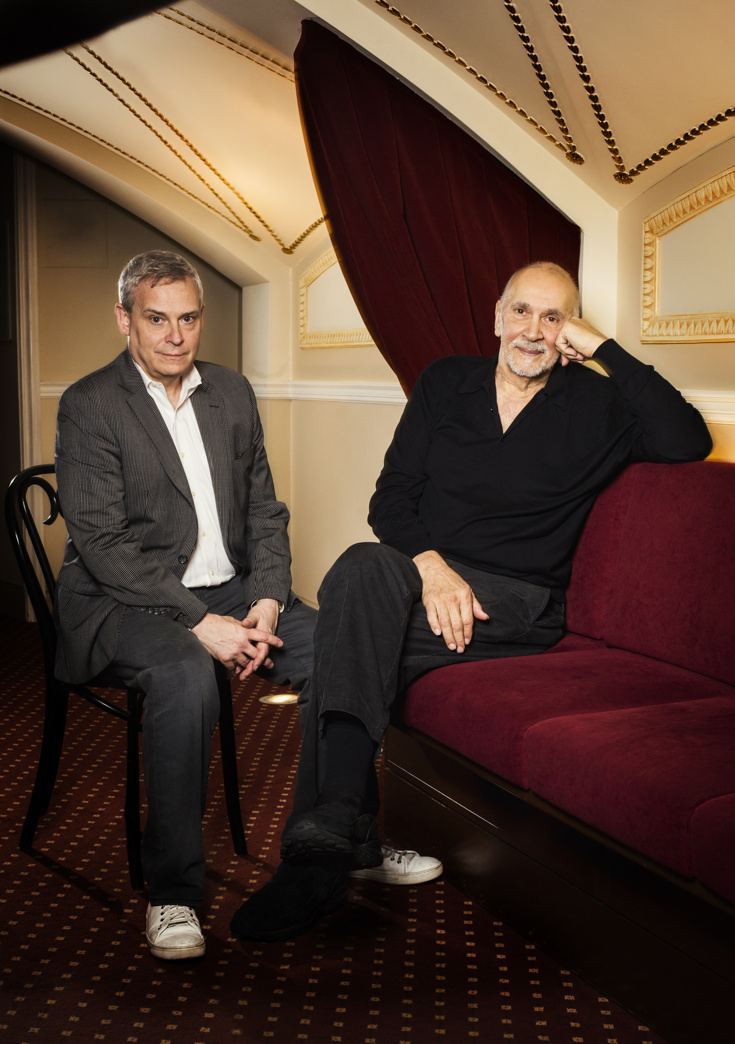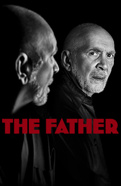The Father Star Frank Langella & Director Doug Hughes on How Not to Be Intimidating, So-Called Celebrities & Awards Season

(Photo: Caitlin McNaney)
At 78, three-time Tony winner Frank Langella is enjoying one of his best years ever, with juicy TV roles as a Russian spy in The Americans and a racist Southern senator in HBO’s adaptation of All the Way, plus a towering, Tony-nominated performance as a patriarch sinking into the abyss of Alzheimer’s disease in Florian Zeller’s The Father. The play reunites Langella with Tony-winning director Doug Hughes, who guided his performance as Sir Thomas More in the 2008 revival of A Man for All Seasons. Sharing tart observations on the perils of celebrity, the 6’ 3” actor is as witty and magnetic as when he played Dracula on Broadway almost 40 years ago. Before the matinee of a two-show day, Langella and Hughes took a break at MTC’s Samuel J. Friedman Theatre to chat about The Father, fame, and their real-life aptitude for spying.
Q: How does it feel to be the hottest actor in New York?
FRANK: Hot turns to cold very easily, so I’m just enjoying it. I remember writing to a friend, rather obnoxiously, “I’m the toast of Paris!” when I was about 24 and in a big hit there. She wrote back, “Toast one minute, crumbs the next.”
Q: In an interview during your run in Cyrano, you commented that leading roles take a lot of energy and you didn’t expect to do them much longer. That was in 1997!
FRANK: That shows you how full of shit I am. I’ve played about 20 since then.
DOUG: King Lear!
FRANK: At around that same time, I was walking through [the Theater District restaurant] Orso, where Betty Bacall used to command a table that I now command. I was doing Noel Coward’s Present Laughter, and I said to her, “I don’t know how many more of these I have in me. It’s exhausting.” And she just went, “Oh, please!”
Q: What’s your secret?
FRANK: I was born with a healthy Italian constitution, and I’m not being in any way facetious. I have enormous reserves of energy, and you just cannot play these roles if you’re not lucky that way. I’ve had my sicknesses, but I have good breath, good energy and—what I didn’t think I had left, and Doug helped me with enormously—good focus.
DOUG: The rehearsal hall is a very inspiring destination with Frank in it. There’s a technique and a daring and a love of the work that makes it a joyous experience. One never has to encourage Frank to get into the pool. He will dive in! It’s wonderful to be in the presence of a dedicated life, and that’s Frank.
Q: Doug, were you intimidated when you began working with Frank on A Man for All Seasons?
DOUG: I was, but I got over it quickly because Frank is very gracious. He neutralizes that immediately.
FRANK: I make it a point to get people past the “Oh, Mr. Langella” stage as quickly as I can. I’m self-deprecating, and I try to be funny. I will purposely do something asshole-ian in order for the company to go, “Oh, good.” This company is loving and warm, and we’re all close. They make fun of me a little too much now.
Q: Frank is the opposite of frail, physically and mentally. What’s it been like to take on a character in the throes of Alzheimer’s—and why did you want him to star in The Father, Doug?
FRANK: It was terrifying. I’m on my way to 80, and you can take one of two roads. The road I don’t like is locking in on what you’ve always been—playing the thing for which you were initially loved. In the early days, I was a romantic leading man. I gave that up a long time ago, but I have friends who fight to stay as they were. I keep saying, “Don’t put those needles in your face. Why compete with a 50-year-old? You’re 70.” The other road is saying, “I’m really scared, I’ve never done this before, but I’m going to go the distance.” That’s the road I’ve tried to take.
DOUG: I always wanted Frank for this role because there’s a heroic energy to it. When I read the play, I said, “You need a big tree to fall,” someone with majesty, if it’s going to take on all the resonance it can for the audience. Watching an actor give it all up, as Frank does every night, makes something terrifying more approachable.
Q: Frank, you recalled famous people you’ve known in your memoir, Dropped Names. Has the meaning of celebrity changed since you made your Broadway debut 50 years ago?
FRANK: I don’t think there is “celebrity” now. There are people who become famous for a few minutes, often for the wrong reasons. The “celebrity” I grew up with was that of Deborah Kerr and Colleen Dewhurst and Anne Bancroft and Barbara Stanwyck, at a time when magnificently gowned women behaved in public like great ladies. Today’s so-called celebrities behave revoltingly, in my opinion. We celebrate the worst in ourselves.
DOUG: I think acting on the stage is a great leveler. Talk show or tabloid celebrity becomes irrelevant when an actor steps upon the stage—it’s either happening or it isn’t. The possession of a lifestyle brand or a Golden Globe suddenly becomes superfluous.
Q: We’re knee-deep into awards season, and you’re up for your fourth Tony. Do you enjoy the hoopla?
FRANK: No. I enjoy getting the award. The rest of it, I can do without. And I don’t like not getting it. I walked up to one of my competitors the other day at a party and said, “Hello, I really hope I win!” And he said, “I really hope you sit in that seat.”
Q: Frank plays a KGB agent in The Americans. Would either of you be a good spy?
FRANK: I don’t think I would because I have a lot of trouble keeping secrets.
DOUG: I would be a fabulous spy.
FRANK: He would! He’s much more inscrutable. When I was a young actor, a designer took me aside and said, “You’re not going to succeed in this profession. You’re too blunt.”
DOUG: Frank’s T-shirt would say, “I’m only saying what you’re thinking.” If something in the room is being delicately tiptoed around…
FRANK: …I’ll say it!
